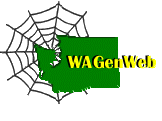Pioneer life in the Benton Co. WA area
‘Dad’ Owens Knew Something About Everything
By BURTON 0. LUM
Tri-City Pioneer
Tri-City Herald, Sunday, November 13, 1960, page 13.
De Witt Owen, Pasco’s “Dad Owens” was one of its most jovial and well liked early citizens. A tall, stopped, man, he resembled “Father Time.” A tremendous long graying beard covered his face. His twinkling Welsh blue eyes beamed out through a thicket of whiskers. His bold sunburnt and freckled head was seldom covered by a hat or cap. His forebearers had come from the New England state to Iowa in the early days.
He grew to manhood in Iowa before the Civil War. A natural mechanic, he was an expert in most of the crafts. When the Civil War began, because of his various abilities, he was not sent to the battle front. He was to fill in at home in any capacity needed.
The war ended. He married the town’s belle and started a fruit tree nursery. Young De Witt threw his talents into the business. It prospered under his operation.
Life was rosy for the young couple. A blessed event was expected. Sorrow struck as the young wife died in childbirth. De Witt Owen was crushed. He was an only child, his parents had both passed away shortly before the war. He sold everything of value he possessed and joined a wagon train for the Oregon Country.
Arriving in Salem, he sought employment. A fabulous gold strike had just been made in Idaho. Stern wheel boats were being built above the Celilo Falls of the Columbia. They were to ply up the Columbia and the Snake to Idaho. He secured employment in the construction of these stern wheelers. As a mill wright he took many trips on these vessels.
He became interested in Indian Curios. There was one location on the Columbia near the mouths of the Yakima and the Snake that was very rich in Indian Curios and Artifacts. He settled on this spot to ply his hobby.
When the Northern Pacific Railway Co. selected this location for the site of its division point and called it Pasco, he was on the ground floor. He helped with the various buildings then purchased lots in the newly platted townsite. He constructed cottages to rent to the railroad employees and also built a cottage for himself containing a large room for his Indian Curios.
Tiring of batching, he wrote glowing reports to his niece Miss Peace. She was graduating from a leading Boston art school. She came West to see him. Arriving on the night train, she was met by her uncle. The next morning she arose early to view the landscape that her uncle had so glowingly described in his letters. She stood on the front porch gazing out on the thick sagebrush, sand, prickle pears, alive with horned toads and lizards. Uncle approached, she turned and said, “Where is the timber you wrote about?” Pointing to the sagebrush he said, “That’s it. It isn’t very tall but it is quite thick.” His niece did not panic at the situation. She visualized an art studio built in their cottage wherein she could finish and hang her canvases depicting the wild, hideous, unconquered aspects of the now existing scenes. Her huge trunk contained an ample supply of art materials, brushes, crayon, pencils, canvases, academy board and a china kiln. Uncle De Witt built the studio.
The culture of Boston had entered the Wild and Wooley West at Pasco. Pasco was booming. The studio boomed. A romance was booming. Miss Peace, his niece, was losing her heart to young Civil Engineer Rockwell of Cornell University who had just finished his task of laying out the Kennewick Ditch. His engineering ability displayed in this project was outstanding. He was called to California to take charge of a large proposed irrigation project. Miss Peace sold her studio. They were married and left for California.
Uncle De Witt would not leave Pasco. He ate his meals across the street at the Pasco House. “Dad Owens” was always ready to give a helping hand. Many sought his aid in solving their problems.
Pasco’s leading grocer was annoyed by his neighbor’s large dog. The dog was too familiar with the grocer’s sidewalk vegetable display. The grocer asked “Dad” what he should do. Dad said, “I will take care of it for you Bill.” The next morning bright and early “Dad” stood nonchalantly near the sidewalk vegetable display carrying on old walking stick, the lower end of which he had broomed up and soaked in turpentine.
Soon the dog came to pay his respects. “Dad” poked the dog with the turpentine soaked end of the cane. The canine leaped high into the air emitting a howl “longer than a Missouri wagon tongue.” He landed on his haunches and skidded along on the splintery wooden sidewalk yelping Oo-ya, Oo-ya, Oo-ya! Do you know? They could never make that dog walk on that side of the street again.
Return to Index of Burton Lum Articles
